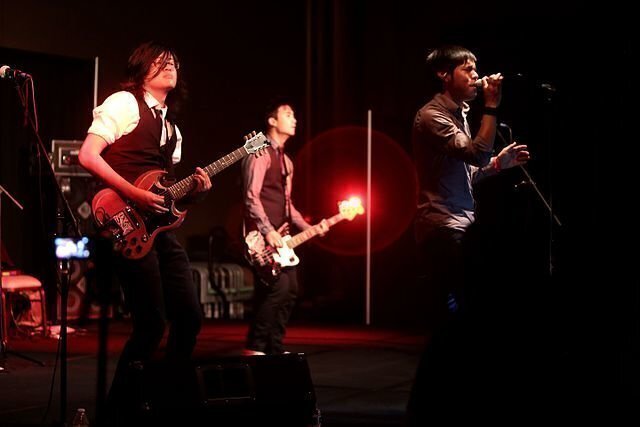
The Slants (credit: Gage Skidmore)
* Editor’s Note: This week’s episode of We the People, to be released tomorrow, covers the issues and arguments in Lee v. Tam. Browse previous episodes.
This morning, the Supreme Court hears oral arguments in Lee v. Tam, which has been in the courts since 2011 and was accepted by the Court last September. The case involves the Slants, a musical group that was founded in 2006 and is based in Portland, Oregon. On its website, the band touts itself as the “first and only all-Asian American dance rock band in the world.” In addition, the group says it is “actively involved with helping marginalized communities, leading discussions of race and identity, and raising awareness of social justice issues.”
The band, which consists of four Asian Americans, acknowledges that its name has been used as a racial slur; however, the band argues that its name follows a “long tradition of ‘reappropriation’” in order to reclaim racial slurs and take away their power.
In 2011, the band attempted to trademark their name with the U.S. Patent and Trademark Office (PTO) but was denied. The PTO based its decision on a mid-20th century law, the Lanham Act, according to which the government may refuse to approve trademarks if they “consist” of “immoral deceptive, or scandalous matter; or matter which way disparage or falsely suggest a connection with persons, living or dead, institutions, beliefs or national symbols, or bring them unto contempt, or disrepute.”
The Slants decided to file a lawsuit against the PTO and in December 2015, a panel of judges on the U.S. Court of Appeals for the Federal Circuit ruled that the band name was a form of “private speech and therefore protected by the First Amendment.” The court found a part of the Lanham Act invalid under the First Amendment, stating, “The First Amendment protects even hurtful speech.” Echoing those who dislike the idea of PTO bureaucrats deciding what is considered offensive, the author of the majority opinion wrote, “Whatever our personal feelings about the mark at issue here, or other disparaging marks, the First Amendment forbids government regulators to deny registration because they find the speech likely to offend others.”
While the band and staunch defenders of free speech saw the decision as a victory, there is still some concern about the consequences of limiting government regulation of trademarks under the Lanham Act. As NPR explained, the “decision could mean more registrations of offensive marks.” The government’s position defends the purpose of the Lanham Act, which is not to stifle speech, but rather to place parameters on what kind of speech is sponsored by the federal government. For example, in a 2015 Supreme Court case, Walker v. Texas Division, Sons of Confederate Veterans, Inc, the Court ruled that the state of Texas does not have to sponsor imagery or speech that it finds objectionable. That decision did not change the First Amendment rights of the individuals in the organization to put Confederate imagery on their property or person. The Court simply held that the state has a right to deny government sponsorship of certain imagery, words or ideas. The government also argues that, because trademarks “serve a commercial purpose,” they are entitled to less protection under the First Amendment than other forms of speech.
Following the decision of the circuit court, the PTO subsequently appealed to the Supreme Court, which will decide whether the relevant portion of the Lanham Act can stand up to First Amendment scrutiny.
The Court’s ruling could impact the litigation and controversy facing the Washington Redskins. In the past few years, there have been fervent public debates over the legality and morality of trademarking names that could be considered racially offensive, especially when it comes to sports teams. At the center of this debate are the Redskins, with a name some deem to be racially insensitive to Native Americans. The trademark on the team’s name was revoked under the Lanham Act; the team now has a pending lawsuit challenging the decision of the PTO.
If the Supreme Court affirms the decision of the lower court, aspects of the Lanham Act will be held unconstitutional and the Redskins will have grounds to overturn the PTO’s decision. Indeed, the Redskins filed a petition asking the Court to hear its case alongside that of the Slants, but the Court declined.
Maggie Baldridge is an intern at the National Constitution Center. She is also a recent graduate of Dickinson College.







